- Home
- John Jakes
Savannah, or a Gift for Mr. Lincoln Page 7
Savannah, or a Gift for Mr. Lincoln Read online
Page 7
“‘Thou shalt not steal.’ That’s a commandment, though I disremember which one.”
“Eight,” said the colored boy.
Private Spiker leaned out an open window. “Hey, boy, can you read?”
“No, sir, Bible was taught to me by a preacher man. ‘Thou shalt not steal.’ Commandment number eight.”
Professor Marcus turned on him. “Shut your craw, you uppity nigger.” He looked at Winks with more venom than the sergeant had ever seen in his eyes. “You going soft on these people?”
“Oh, I don’t expect so. Maybe I’ve just had my bellyful of you. Or maybe I rank you, so I don’t need to explain an order. I want you to climb into one of those dresses, this minute.”
“You’re joshing.”
“I’m not. Hop to it before I clip your toenails with this.” He twirled the Deane & Adams.
The old woman broke her frozen pose and limped toward the porch. “Tell him to wear the purple-dyed one. I was going to rip it up for rags anyway.”
“You heard her,” Winks said agreeably.
The professor started to argue, saw the set of Winks’s jaw, and desisted. Muttering oaths Winks was happy he couldn’t hear, Marcus stomped inside. “Spiker, you go and watch him, see he does it,” Winks said to the other soldier, who was enjoying the byplay. Spiker vacated the window.
A smile flirted on the woman’s thin mouth. “You Yankees ain’t so terrible mean after all.”
“That is true, and please tell your neighbors. We’ll make sure to leave you some corn.”
That cracked the old lady’s shell. She made a pitcher of ersatz lemonade for them, a few pinches of citric acid powder mixed in well water. She apologized for the weakness of it, saying Florida lemons could no longer be had, not even in their home state. Her daughter, married to a Macon apothecary, had sent her the citric acid. After a turn with the shovel, Winks thought the lemonade tasted fine. The professor refused to try it.
Several hours later the detail departed from the little farm. Professor Marcus wore the purple-dyed dress and a rope around his neck, the other end of the rope tied to the back of the loaded wagon the colored boy drove. The professor carried a scrap of shingle on which Winks had carved the word THIEF.
As they proceeded in the fading daylight, Winks couldn’t fully understand why he’d done all that he’d done today, except that Marcus had rubbed him raw with one quotation and one theft too many. When he glanced back at the professor staggering along, eyes maddened with humiliation, Winks figured he’d made another mistake, perhaps one even more serious than pulling the colored boy out of Ebenezer Creek.
Ah, but this new mistake felt so good. He’d worry about consequences tomorrow.
Legrand was afraid. He couldn’t recall being so afraid for so long at any other time in his young life. It was the pinnacle, the paradigm, the apotheosis of fear. (Legrand borrowed books from Sara Lester, hence knew plenty of four-dollar words.)
Fear chewed at him during his waking hours and long into the night, when he tried to doze with chill rain falling on his raggedy tent and the Union sentries shouting insults or firing their weapons to ruin sleep, out there across the flooded rice fields that glowed with reflected moonlight when it wasn’t raining, hailing, or otherwise making life more difficult. In return, Confederate artillerists bombarded the enemy day and night, expending a tremendous number of rounds, as many as three hundred in twenty-four hours. Most of the time Legrand was sleep-starved, hungry, sodden, in addition to being terrified.
One of the defenders, a farm boy, expired six hours after his mortar blew up and shot him full of metal fragments. Legrand was both mesmerized and horrified by the death, the first he’d ever witnessed. It sharpened concern for his family. He prayed they were safe at the Pulaski House, likewise Mrs. Lester and Hattie, whose barbs he’d quite forgotten. Hattie would surely think better of him for this service, provided he survived it.
Seaward, nightly signal rockets sparkled and left smoke trails to remind Legrand of the omnipresent blockade ships below the horizon. He liked that word, omnipresent. He didn’t like what it signified: They were trapped between the jaws of Sherman’s vise of wrath. Sherman had four divisions facing Savannah in a broad arc. General Wright’s seven-mile defense sector faced Gen. O. O. Howard’s entire XV and XVII corps, somewhat to the west southwest of the city. To launch a frontal attack, the Yanks would have to risk exposure on the causeway of the Savannah & Gulf railroad or wade through icy water shoulder-deep. Everyone assumed the attack would come eventually, even though, like Savannah’s defenders, the Yanks were rain-soaked and hungry. At night they soldiered mostly in the dark, having learned that campfires and waving lanterns invited return volleys.
Wright’s part of the Confederate line was thin: around 2,700 troops and thirty-two coastal siege guns and mortars laboriously hauled from Savannah River emplacements. Rifle pits and a series of hastily built fortifications guarded the flooded land, the Little Ogeechee, and the causeway. The parapet of any fort was the most hazardous position. Grandpa Stubbs was one of those given the dubious honor of standing on a parapet as a spotter for a mortar battery.
Legrand realized he’d slept a while when Savannah church bells woke him. He knuckled his eyes, saw daylight. His lieutenant, a bearded former divinity student, hustled down the line of homemade tents, stopping long enough to kick each sleeper awake. The bells reminded everyone that the defenders were backed up perilously close to town—four or five miles.
At the cook fire, Legrand sleepily greeted comrades. Some were callow, some were half senile, but all were bonded together. Grandpa Stubbs squirted out a stream of tobacco juice and said, “What’s fer breakfast? Don’t tell me. Rice on toast, without the bread.” Never partial to bathing, Grandpa smelled like the inside of a steamer trunk used for storing dead squirrels.
Legrand coughed, stepped back, and allowed as how Grandpa had called it correctly. Legrand’s partner appeared, a dry-goods clerk named Buster Buskin. Buster had squinty eyes that were greatly improved when he smiled. Buster chafed his threadbare sleeves and shivered. “Another cold one, huh?”
Legrand glanced at the sullen sky. “But no rain yet, thank the Lord.”
Grandpa worked the plug to the other side of his jaw. “Sunny thoughts for sunny times, eh, boys?”
“Yes, sir, absolutely.” Legrand refused to express his fear-driven pessimism. “No reason to weep and moan. Distracts from the duty.”
“I wouldn’t mind being distracted by a minié ball, all the way back to the invalid corps. You boys hear them other guns last night, yonder over the city?”
Buster had but Legrand hadn’t: “Sherman isn’t attacking from South Carolina too, is he?”
“Nuh-uh, Old Reliable’s burnt all the bridges and ferry boats.” Legrand thought, No way to escape? Grandpa continued. “Those was ours, gunboats on the Savannah at high tide.”
Legrand finished his dollop of rice, wiped his mouth and then his tin plate using his sleeve. The lieutenant came by to say the fire had been started at the hot-shot furnace, an ovenlike brick structure well to the rear. He told Buster and Legrand to look sharp and get to their posts. While they double-timed to the furnace, Legrand readjusted his soggy kepi. “What day is this?”
“Fourteenth.”
“Can’t be, Buster. Yesterday was Monday.”
“All right, the thirteenth.”
“More than halfway to Christmas.” Legrand was surprised and excited; the holiday had been out of mind since he arrived on the line.
“Bet a million they cancel it this year. Everything’ll be canceled but the whupping we’re gonna take.”
“Buster, your attitude’s too negatory.”
“You blame me? Just look at this pitiful excuse for an army.” His gesture swept the line, from rifle pits where waking oldsters scratched at busy vermin and adjusted their porcelain dentures, to the seacoast guns and mortars where General Wright had placed his few experienced men. Some were missing an arm or
an eye, or hobbled on crutches. Curiously, these maimed veterans seemed the most feisty and battle-hungry of the lot.
Legrand and Buster serviced a thirty-two-pound seacoast gun at the fort’s extreme left flank. For this they employed an iron rod with a shallow ladle in the center. The man in charge of the furnace used tongs to extract the glowing round shot and lower it into the ladle. He and Legrand and everyone else who worked with hot shot wore thick padded gloves. The shot pulsed bright as a small sun.
Legrand and Buster ran the hot shot forward. Legrand glimpsed Grandpa Stubbs climbing back to the parapet while the mortar crew readied a round. Men at Legrand’s thirty-two-pound smoothbore rammed a dry wad, then two wet wads down the barrel, on top of the powder charge. The first time Legrand went through the drill, he wondered aloud why the hot shot didn’t instantly detonate the powder. The instructor loftily informed him the shot would cool in the gun before it burned through the wadding. “Read the manual, Johnny.” Legrand took the answer on faith, albeit nervously.
They tipped the ladle; the shot slid down the barrel, clonk. Legrand and Buster retreated, averted their heads, and poked their fingers in their ears as the corporal fired the long gun. The red-hot shot went blazing over the waters and blew up a geyser of mud not far from some Yankees doing an eccentric dance to stay warm. The spotter peered over the parapet with field glasses.
“Miss.”
No surprise—demoralizing rather than damaging, hot shot seldom did more than set fire to wagons or command tents. It was far more terrifying at night, when it flared across the sky like a meteor from Hades.
Yankees sniped at the spotter, who dropped behind the wooden parapet holding his bullet-pierced felt hat. Legrand and Buster hurried back to the furnace. Thus the morning passed, alternating periods of activity and boredom punctuated by spates of rain and the heart-stopping arrival of Yankee shells. Grandpa Stubbs daringly continued to expose himself on the parapet, no doubt awaiting the minié ball that would conclude his service without foreshortening his life. He waved his hat and shouted abuse at the enemy, but no one picked him off. Maybe they deemed him too old, unworthy of a bullet.
A midafternoon lull in the cannonading was followed by a furious renewal of artillery fire across the Ogeechee. Smoke clouds trailed away to the west. “Sounds like they’re after the fort again,” Buster said.
In the late afternoon the sounds of battle drifting on the salt wind fell off. Sometime after six, Legrand heard distant brass blaring “John Brown’s Body.” He ran up the ladder, peeked over the parapet, but darkness prevailed. Then star shells showered red lights above the Atlantic. They looked a mite too celebratory.
The band music was soon drowned out by a queer baying sound, rising in the north, toward town. It seemed to sweep toward the Confederate batteries like a huge storm wave. Legrand struggled to identify the sound; when he did, his scalp crawled, and his stomach dropped down to his ankles.
“They’re cheering,” he informed Buster. “The Yanks are cheering along the whole front.” Giddily brave, he leaned over the parapet and put his hands to his mouth, trumpet-fashion. “Hey, Yank, what’s that yelling about?”
An unseen picket answered, “McAllister’s taken. The cracker line’s broken—how do you like that, reb?”
Legrand relayed the news to his friend. Buster said, “We’re in the soup kettle for sure.” This time Legrand didn’t advise him that his attitude was negatory; he feared Buster was right.
Soon thereafter, Union batteries opened up again, lobbing rounds into the defense lines. The brass bands played throughout the bombardment; the hurling of shot and shell kept Legrand and his mates crouching with their heads covered.
Around ten, a mounted courier arrived. He nearly drowned in a sea of clamoring men: “What’s happened?” “Tell us.” “Is McAllister fallen?”
“It is.” Groans greeted the confirmation. “Hazen’s division overran it late this afternoon. Whole thing didn’t take but about twenty minutes. They say Bill Sherman watched from the roof of Cheeve’s rice mill this side of the river.”
Someone asked, “Many of our boys killed?”
“Two dozen, give or take, that’s the word. ’Bout the same for the Yanks.”
“But they got replacements,” another weary speaker said. “Sometimes I think they spit ’em out like machine parts.”
Officers ordered men back to their posts. A new round sailed in, thunderously raising a dirt cloud way back by the hot shot furnace. Legrand rubbed his hands together, fighting off a new attack of fear for his parents; his crippled brother, Sparks; Mrs. Lester; Hattie; and all the innocent folk now trapped in Savannah. Every man on the line knew the value and significance of Fort McAllister. It was the last river bastion blocking Sherman’s path to the sea. Ossabaw Sound lay open; Yankee ships could bring in food, and arms, and more and more men.
As if encouraged by the victory, the Yanks kept up their shelling long into the night. Legrand couldn’t sleep. Finally he rolled out of his mothy blanket and crawled from the tent. Buster roused. “You kicked me. Where you going?”
“Just up to the parapet for a peek. I never heard such a good time being had.”
“Wouldn’t do it. Wouldn’t stick my head up.”
Legrand disregarded the advice and scampered up the ladder. A picket saw him but didn’t bother to challenge him, so deep was the mood of despair on the defense line.
Legrand gripped the splintery edge of the parapet. Oh, my Lord—watch fires flickered all along the Ogeechee’s southern shore. Under the white winter stars, a band jauntily played “Camptown Races.” He heard a shell whistling in.
Frantically he started down the ladder. He’d gone but halfway when the shell blew up the parapet and knocked it apart in a tornado of dirt and splintered wood.
Five days at Miss Vastly Rohrschamp’s convinced Hattie that Savannah was in a considerable fix. Sherman’s hordes surrounded the city. The vandal-in-chief had established headquarters at an outlying plantation. Bits and pieces of information brought into town by deserters, informers, and a few unfazed scribblers for the local papers told of Sherman’s diabolical doings:
Yankee soldiers were lowering the water level in the flooded rice fields to prepare for a land assault. From the garrison at Hilton Head, thirty-pound Parrott rifles were being shipped by water to add firepower to the siege. A long wharf and storage depot were under construction at King’s Bridge; supply boats steamed up the Ogeechee from ships anchored off Tybee Island. To supply the Union’s left wing, small boats captured from plantations transited the Ogeechee Canal to the Savannah River. An almighty fix made even worse because Christmas loomed.
Possibly it would be the saddest Christmas ever experienced in Hattie’s corner of Georgia. Shops along Bay and Broughton streets were shuttered or, if open, displayed mostly dust balls in lieu of merchandise. Children awaiting Saint Nicholas might find their chimneys blown away by Union cannon before the jolly old elf had a chance to climb down. Even the weather was out of kilter: balmy with thundershowers threatening.
Before the war, Sara had wryly dismissed Savannah as slow, sleepy, and sedate. Fine homes still enhanced Governor Oglethorpe’s charming squares; the finest, owned by a British cotton merchant named Green, had cost over ninety thousand dollars new. In the poor districts, shanties crowded tiny lots; petty crime was rife.
An abundance of mossy oaks still shut out the sun on the main streets, where pride-of-India trees grew untended on promenades down the center. In the midst of war, everything was crowded, dangerous—incessantly noisy. It wasn’t the joyful noise of carolers celebrating the season, but the bang and boom of Confederate batteries replying to the attackers, together with the clamor of caissons and carts in the streets, teamsters shouting and swearing, soldiers and sailors roistering on the sidewalks and loudly accosting strangers. From time to time the very sod shook underfoot. Day and night, Miss Vee kept her doors bolted and her windows latched, never mind the temperature.
S
avannah’s prewar population had been about twenty-three thousand, at least a third of those slaves and freedmen. Now there was no reckoning how many persons the city contained. Army tents overflowed the squares. Forsyth Park, just past the southern city limit at Gaston Street, was a vast campground. Vee said naked soldiers were rumored to bathe in the park’s glorious fountain. Her lip trembled in the telling.
Miss Vee’s house occupied a lot on the south side of East York Street, number 5, within sight of Wright Square. From the tiny front yard, Hattie could gaze on tents and lean-tos despoiling the square together with a lot of dispirited men, some visibly inebriated well before noon. Surely Legrand hadn’t turned into one of those.
The row house resembled many another Savannah dwelling: storerooms on the ground floor and the living area one flight up. This first floor consisted of a parlor and separate dining room in front, two bedrooms and a kitchen behind. The necessary was reached by descending the rear stairs and following a path to the back of the garden.
The house showed many signs of the late Dr. Rohrschamp’s profitable practice. The kitchen had a cast-iron stove with a pivoting crane for kettles. The parlor was furnished with good imitation Sheraton chairs, floral wallpaper, and a colorful Currier & Ives depiction of Mount Vernon. Pride of place belonged to a polished upright piano from Chickering & Sons, Boston. Dr. Rohrschamp had bought the piano in 1851, before sectional antagonisms made commerce with Massachusetts questionable. A little snooping showed Hattie that Miss Vee had reinforced her piano bench with iron braces invisible to the casual observer.
Vee moved into the smaller bedroom so Sara could sleep in a large feather bed and Hattie on the trundle rolled out from underneath. Hattie’s pet fitted less easily into the household routine. Amelia presented problems of personal hygiene, namely the pungent odors generated by her species. Vee courteously but firmly refused to allow the pet to live in the house. Hattie created a makeshift pallet on the back stoop, tying Amelia there except for the times she walked the pig on a rope. She’d brought a sack of old corn cobs from Silverglass and rationed these sparingly. Amelia did clean up small portions of garbage the humans created but even so, she seemed to grow sadder, thinner too. The once-lively pig spent long hours asleep.

 The Bastard
The Bastard The Furies
The Furies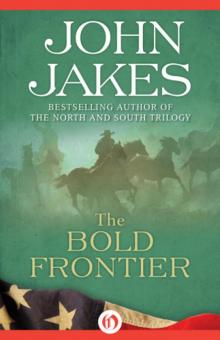 The Bold Frontier
The Bold Frontier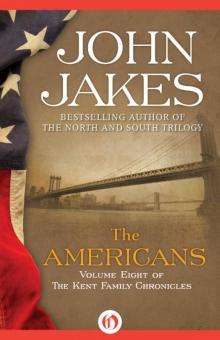 The Americans
The Americans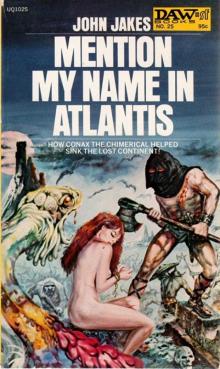 Mention My Name in Atlantis
Mention My Name in Atlantis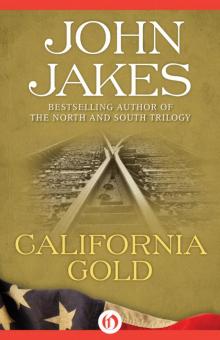 California Gold
California Gold North and South
North and South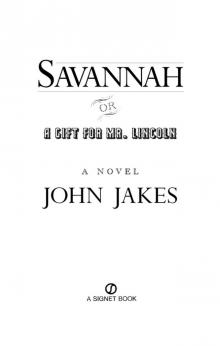 Savannah, or a Gift for Mr. Lincoln
Savannah, or a Gift for Mr. Lincoln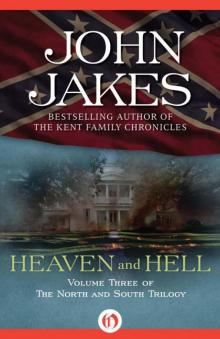 Heaven and Hell
Heaven and Hell Homeland
Homeland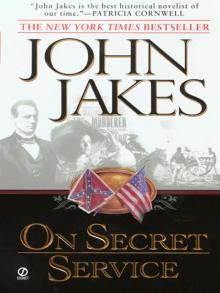 On Secret Service
On Secret Service The Lawless
The Lawless The Titans
The Titans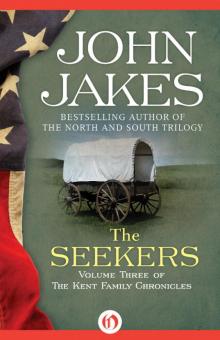 The Seekers
The Seekers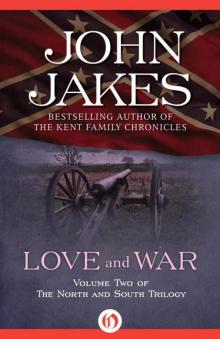 Love and War
Love and War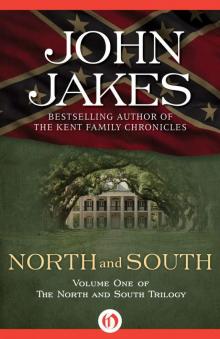 North and South: The North and South Trilogy (Book One)
North and South: The North and South Trilogy (Book One)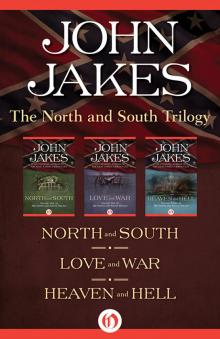 North and South Trilogy
North and South Trilogy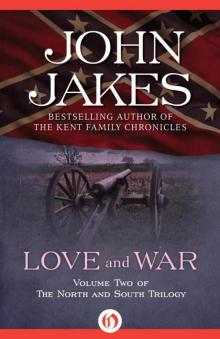 Love and War: The North and South Trilogy
Love and War: The North and South Trilogy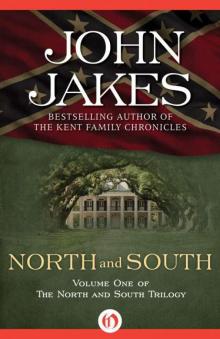 North and South: The North and South Trilogy
North and South: The North and South Trilogy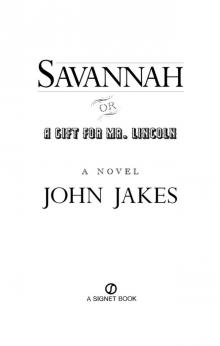 Savannah
Savannah Lawless
Lawless Conquest Of The Planet Of The Apes
Conquest Of The Planet Of The Apes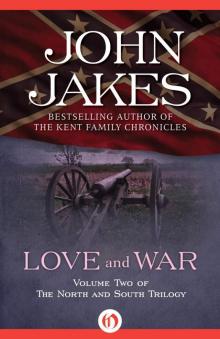 Love and War: The North and South Trilogy (Book Two)
Love and War: The North and South Trilogy (Book Two) The Rebels: The Kent Family Chronicles
The Rebels: The Kent Family Chronicles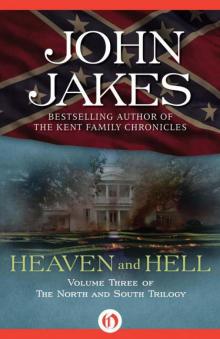 Heaven and Hell: The North and South Trilogy
Heaven and Hell: The North and South Trilogy Planet of the Apes Omnibus 2
Planet of the Apes Omnibus 2 The Bastard: The Kent Family Chronicles
The Bastard: The Kent Family Chronicles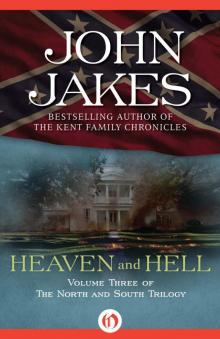 Heaven and Hell: The North and South Trilogy (Book Three)
Heaven and Hell: The North and South Trilogy (Book Three)